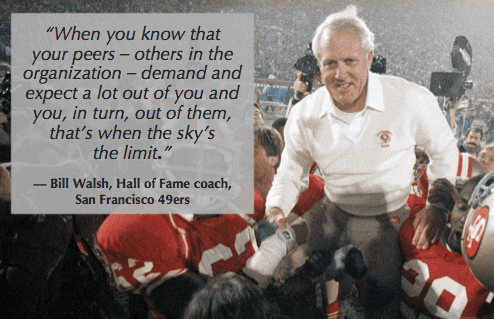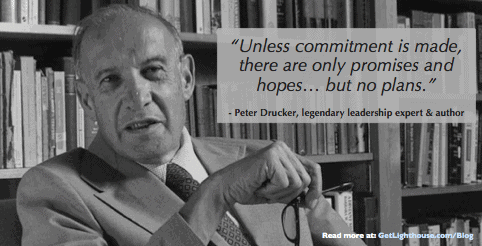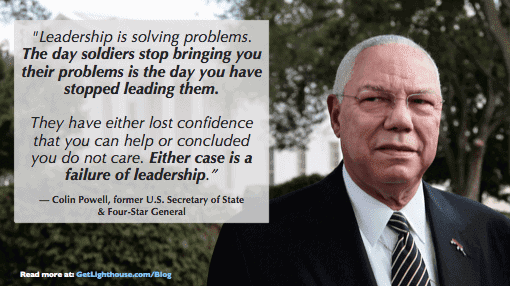"The difference between mere management and leadership is communication."
Winston Churchill
As Winston Churchill captures so well, good communication is central to your success as a leader.
When your organization grows to have layers between you and other team members, the skip level meeting becomes one of your best tools for effective communication.
We recently took a deep dive into what makes a great skip level meeting. Today, we look at what to talk about in your skip level meetings, with specific questions you can ask to improve communication throughout your organization.
Table of Contents:
- Skip Level Meeting Questions to Build Rapport
- Skip Level Meeting Questions to Get Manager Feedback
- Skip Level Meeting Questions to Get Team Feedback
- Skip Level Meeting Questions to Give Praise
- Skip Level Meeting Questions to Ask in a Crisis
- Skip Level Meeting Questions to Ask Every Time

66 Questions to Ask in a Skip Level Meeting to Improve Your Leadership
The skip level meeting is all about improving communication and the flow of information. If you find yourself trying to accomplish any of the following, then you will get a lot of value out of skip level 1 on 1 meetings:
- Find out how your managers are really doing beyond what they tell you.
- Get feedback and insights to help your managers, and their teams, improve.
- Get a pulse on what's happening on the front lines you're layers removed from.
- Build trust with those lower in your organization so they stay engaged and contributing.
- Learn where there is dysfunction, insufficient communication, or confusion within parts of your organization.
- Personally demonstrate you value everyone in your organization in a scalable way.
With just a few hours of your time each week, you can get insights from people you rarely get to interact with otherwise.
Now, let's look at specific questions you can use to accomplish the above goals with your team.

Skip Level Meeting Questions to Build Rapport
If you walk up to a stranger on the street and ask them a personal question, you're likely to get a funny look. Just because you work at the same company, even in the same department, doesn't mean they'll open up to you. You have to build a good rapport with team members.
Remember that cold, too serious boss you had earlier in your career? Or the total jerk who yelled at everyone? If you've ever had a terrible manager, you know you'd want to avoid conversations with them. You're also unlikely to have been fully candid with them if asked a question about you, your team, or your manager.
As Camille Fournier, author & former CTO of Rent The Runway, has championed in a post on her blog:
"As a leader, you will lead people who want Relatedness in their job. They want you to know about their family, their hobbies. They want to chat with you about their weekend, their trips away. They want to get lunch sometimes.”
The best way to create relatedness is to build rapport with them with some questions like these:
- What made you decide to join our company? What were you most excited about when you started?
- What do you like to do in your free time? What are your hobbies?
- If they have children: How is [name of child] doing? (Ask something related to their age like starting school, playing sports, or other interests.)
- What drives you? What motivates you to come to work each day?
- Where did you grow up? Where did you go to college?
- What's your favorite part about living in [your city/town/region]?
- What's your favorite book you've read / podcast you've listened to / movie you saw recently?
- What made you decide to become a(n) [engineer/marketer/sales person/customer success/role]?
- Who do you think makes the best (regional food for your area: BBQ, burritos, etc)?
- Have a trip planned or one recently you really enjoyed?
- Who were some of the people you looked up to when you began your career?
- Are you a fan of any sports teams? Which ones?
The key is to have fun with this. Look for something you have in common, or they're passionate about. When you genuinely listen, you may be surprised how much more enjoyable the rest of your conversation will be.
If you're feeling stumped and need more ideas, here are 102 ways to build rapport with anyone you work with.

Skip Level Meeting Questions to get Manager Feedback
One of the best uses for your skip level meeting is to get feedback from team members on their manager.
Unfortunately, there's a fine line between feedback and "witch hunt" or "digging up dirt on someone." As Scott Boulton writes, you need to come in with the right mindset:
"The goal should be for you to provide better coaching to the manager of the department vis-à-vis some of the information you obtain from the skip level ... [it] can be discussed and shared and through 1:1 coaching, it will allow you to help the department manager be a more effective manager themselves."
Here are some ways to ask for feedback on their manager on skip level meetings:
- What do you need more of to be successful in your current role?
- What do you need less of to be successful in your current role?
- Do you feel you're getting enough feedback from your manager? Why/Why not?
- When was the last time you had a conversation with your manager about your career? How did it go?
- Are you happy with your career progress here? Why/why not?
- Do you feel your manager is approachable? Why/why not?
- How does your manager handle questions when you ask for help?
- What is a recent situation you feel like your manager did a great job?
- What is a recent situation you wish your manager handled differently?
- What's the best part of working with <their manager>?
- What's the hardest part of working with <their manager>? (H/T to Cate Huston for #20 & 21)
- If you were in charge of the team you work on, what's one thing you would do differently? Why?
- How would you describe [their manager]’s communication style? What do you like and dislike about it?
- Would you say your manager is more pro-active, or re-active as a leader? What makes you say that?
The key in all of these questions is to focus on actions, not the person. Getting examples of recent situations, and understanding their underlying motives (via follow up questions) helps you really understand situations.
If you ask similar questions across multiple people you can then also triangulate what really happened and improve the quality of your coaching; everyone's perspective will be different, and they all contain nuggets of truth. Become effective at uncovering them and you'll be a great coach for your manager.

Skip Level Meeting Questions to get Team Feedback
While it's great to get feedback on someone's manager so you can coach them, there's more kinds of feedback to get. Finding out how the team as a whole is doing can reveal all kinds of insights about how people are hired, onboarded, work together, and interact with other teams.
All of these areas can be running like well-oiled machines or loaded with dysfunction needing to be fixed. Identifying them is a great way to help get a team unstuck.
Asking questions for feedback on teams is a great way to uncover them as Steven Sinofsky writes:
"For a larger organization, there's a benefit to spending time in skip-level dialogs on the efficacy of the work environment. Asking questions about the velocity of code, collaboration, getting things done, and so on. In any organization of size, a manager of managers is where action can (and should) be taken to avoid the perils of a stagnating organization."
To avoid a "stagnating organization" try some of these skip level questions to get team feedback:
- What's one thing your team should stop doing? Why that?
- What's the biggest bottleneck or blockers that affects you and your team doing their jobs well?
- If we had budget to get you any one thing for you to make you better at your job, what would you want?
- How is you / your team's workload? Do you feel it's too little, too much, or the right amount?
- Do you feel like underperformers are properly handled here? Why or why not?
- What tweaks would you make to [change x] to help you and your teammates?
- Who are the most valuable people on your team? What makes them essential?
- What's your favorite part about working on your team?
- What's one thing we could improve based on how <last major project they were on> went?
- What do you think your team does really well? What should we be sure you're able to continue doing?
- What is a recent example where you feel like your team performed especially well? What do you think contributed to that happening?
- What is a recent example where you feel like things didn’t go as well for your team? What do you think contributed to that happening?
- Who do you see as potential future leaders on your team?
Getting buy-in is a key part of getting feedback'
Getting feedback from your team is extremely important. One of the best ways you can encourage people to give you feedback is through getting buy-in for changes that either recently happened or are going to happen.
By getting buy-in, not only will you gain a better understanding of what they think, but you’ll get a chance to win them over and learn how best to communicate with them.
If you want to get unfiltered feedback about recent or upcoming changes affecting their team, you need to be intentional about it.
Here’s what you can ask on your skip level meeting to make sure you get buy-in from them:
- If we made [change z], how would you feel about it? What do you like / dislike about that?
- What are your biggest concerns about [recent change y]?
- How do you feel about [recent change x]?
- Do you understand the change and motivation behind the change? If not, what parts are unclear to you?
- How do you feel about the way we announce changes? Do you feel like you both understood it and had an opportunity to ask questions about it? Why or Why not?
- If you could change anything about how we announced this change, what would it be?
- Do you feel like leadership is receptive to your feedback about changes we make?
- Do you feel like your manager sufficiently consults you and your coworkers before making changes? Why or why not?
As a senior leader, one of your tasks is to strengthen the lines of communication at your company. This means not just trying to get buy-in for the changes you make, but also getting smarter about how you announce these changes.
And there’s no better way to learn how to do this than using skip level 1 on 1s and the questions above to hear feedback straight from your teams. Use their answers to find out how you can improve, and where you can coach your managers to do a better job, too.
While many of these skip level questions are looking for problems, don't forget to look for the positive. The old adage, "If it ain't broke, don't fix it" can equally apply. Nothing upsets people like seeing a change that takes away something they really liked.
Looking for more ideas on team feedback in your skip level meeting? Try re-purposing some of these questions to ask a manager, or asking these for remote staff: team building questions for remote workers.

Skip Level Meeting Questions to Give Praise
Mary Kay Ash knows a lot about the power of praise. It's been embedded so deeply at her company that they give out pink Cadillacs to their top performers as pictured above. And the research backs up the power of praise:
"A Gallup study found that getting "praise or recognition for good work” increases revenue and productivity 10% to 20% and that those feeling unrecognized are three times more likely to quit in the next year."
Think back on your career and how much it meant to you when a senior leader praised or recognized you.
You're now in that position.
You have the opportunity to find out who deserves praise and give it to them. You can do so publicly (if warranted) or use your skip level meeting to tell them how valued they are.
Here are some questions to ask in skip level meetings to find out who to praise and why:
- Who do you enjoy working with most on your team? Why them?
- Who has done awesome work lately? How did they contribute?
- Who is an unsung hero in our company? What do they do that deserves recognition?
- Has anyone gone well above and beyond lately? What did they do?
- Do you feel we properly recognize people here? Why / why not?
- Who played a critical role in the success of [recent project x]? What did they do?
- What is the greatest strength of your team? Who personifies that best?
- Who on your team makes those around them better? How do they do it?
- What's something your manager does that you'd like them to continue or do more of?
- If you were forming a new team, who are the people you'd most want on your team? Why them?
The best part about spending time on questions like these is the secondary benefit: uncovering stars. It's not always easy to know who are the most important people in your organization, but your people know.
By asking them, you can identify these stars for praise and recognition, potential bonuses, promotions, career development planning, and more. All of those actions can help make sure you retain your "A players" and create a culture of rewarding the best people, even those who don't toot their own horn.
You can learn more about how to praise your team to bring out their best.

Skip Level Meeting Questions to ask in a Crisis
In a crisis, employees look to leadership for what to expect, what they should do, and whether they should have hope, or give up. As a senior leader, it's even more important for you to lead with strength.
However, after the inspirational speech, explaining why layoffs happened, or talking through strategy changes, you still need to move forward effectively.
Skip level meetings can be powerful to have a two-way discussion; you can see how those difficult messages were received, and get ideas from them that could help change the fate of your company.
Here are some skip level meeting questions to ask in a crisis to be a better senior leader:
- What are your biggest worries or concerns right now?
- How do you feel about our company's current prospects?
- How do you feel about [recent announced change]?
- What are your first thoughts or questions if [possible event: Layoffs, restructuring, canceled project, etc] happens?
- Do you understand why your work is important? If yes, how would you describe it?
- How do you think your work impacts our team and company?
- How do you think we could get more of the right things done despite our current situation?
- What's something we're not doing today that we should do to better serve our customers?
- How do you feel your manager has informed you about the recent changes? What could they improve? What worked well?
As you rise in your career, it's easy to become disconnected from the front lines in your organization. This can lead to both your skip level employees feeling intimidated by you, and you missing out on key, good ideas from them.
By having skip level meetings in a crisis, you can strengthen relationships across your organization, ensure your message is understood, and you might just find new ways to improve your company.
Further reading:
- For more on leading in a crisis, ask these 18 crisis leadership questions,
- Also, consider these tactics to lead happy teams through a recession
- And if you have to do the worst, here's how to do layoffs the right way, even remotely.

Skip Level Meeting Questions to ask Every Time
Many factors can affect which of the above questions you use in a given skip level meeting: the amount of rapport and trust already built, recent events in the company, what you heard in other skip levels, number of times you've met, etc.
Regardless of the other questions you ask, there are 3 key questions you should apply to every one of your skip level meetings:
1) What should they be accountable to do based on what you discussed?
2) What should you be accountable to do based on what you discussed?
Talking is great. It can relieve stress and uncover key insights. However, if you take no action, it feels like a waste of time.
Fail to follow through on what you're told very long and your skip levels won't bring up much to you for long.
Being explicit at the end of your skip level meeting is a great way to ensure they're always actionable. Then, all you have to do is worry about the biggest pitfall of skip level one on ones:
3) Have you talked to your managers about this?
While a skip level meeting can be hugely beneficial, there are a few pitfalls to avoid. The biggest is undermining your managers, and making it possible for their team to go around them to you.
As Marc Davis writes in a great post on skip level meeting pitfalls:
"I've had several instances where a well-intentioned employee ran an idea by me, and I might have said something like "that sounds neat!”
Unfortunately, these employees then went ahead and started to implement these ideas without first running them by their own managers. This resulted in my managers feeling that either I was undermining their authority, or that their employees were."
The best way to avoid this problem is to always remember to ask some form of, "Have you talked to your manager about this?" to make clear that their manager is the main person to communicate with.

Use these skip level questions to uncover key topics for your company
These meetings are about the health of your organization. People leave managers, not companies, so if you don't build a relationship with everyone, you can lose large parts of your department because of a bad manager you didn't know had problems.
Too often, people have the mindset, "If I had a problem with my boss here, I'd probably just leave the company.” This happens when they feel they have no avenue to address problems with their manager.
While there are many things to discuss in your skip level 1 on 1 meetings, this is one of the biggest. This default mindset to give up if you have a bad manager only changes if you do something about it.
These questions help you uncover the direct and indirect opportunities to improve your managers and thus your entire organization.
Are you and your managers wasting their 1 on 1s?
There is no greater investment to make in your team than having 1 on 1s. Yet, done poorly they’re a huge waste of time.
That’s why we made the 1 on 1 Master Class. You and your fellow managers learn step by step how to supercharge these meetings to motivate your teams, fix problems, coach your people, and much more.
You can learn how Lighthouse Lessons can help your leaders like we helped SeedBox Technologies by signing up here.





